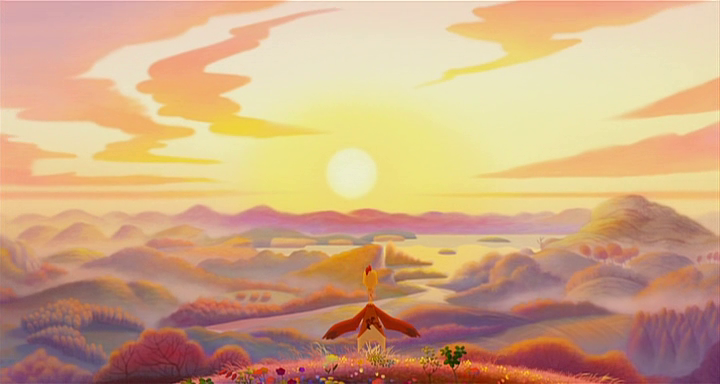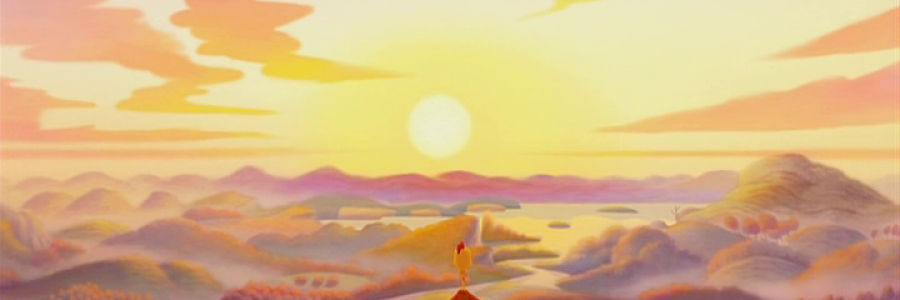Leafie, a Hen into the Wild is a 2011 South Korean animated family film, and that's where I have to pause to explain something.
While absolutely a movie aimed at kids, Leafie is about a female chicken who escapes a farm to live in the wilds among other animals. However, chickens are a prey species, and the story does not shy away from this. Multiple named animal characters die in this film, several early on.
(Note that when this film was brought to North America as Daisy, a Hen Into the Wild, these sequences were slightly toned down. It's clear what happens from context, but there's a little less on screen.)

Leafie herself plays into this dark tone: she's an adult hen who's lived her entire life in a chicken coop in a one-family farm. Even though (spoiler alert) she escapes into the wild, she begins the film sick, and throughout the film her eyes are always a little sunken and she always has a little cough. Her early life has damaged her, permanently, and she wasn't even living in excessively traumatic industrial conditions. This film doesn't shy away from dark material.
But this occasionally dark story is told with beautiful environments and some lovely animation. It's a little rough in spots; as the two-dimensional characters move in three dimensions sometimes details of their designs don't quite rotate as you'd expect. But then the movie will give you a breathtaking shot of birds flying through the sky accompanied by soaring music. The staff put artistry into this film; it feels loved.

Love becomes one of the film's central themes, as Leafie faces choices based on her own feelings. The film could have very easily turned into a simple adventure story of a chicken dodging threats and encountering strange characters, and while the film has both those things, the story's driven by and very much focused on the topic of maternal love. What do mothers do?
As you can tell, I think that Leafie is a remarkable film. It's a family film that doesn't shy away from tough decisions, celebrating community, personal growth, and life itself.
Analysis - Spoilers Below
As I was preparing this review, I was struck by how many different themes are addressed in this film.
First and foremost, Leafie is about being a single mother. Leafie so desperately wants a child that she adopts someone else's egg, and when it hatches she does everything she can to raise him properly.

This is best illustrated in an unforgettable scene: Leafie realizes that her son Greenie feels embarrassed by the ribbon on his leg, so she pecks away at it until her beak is bloody, and she does so happily. The pain is nothing to her as long as it would make her son happy.
Interestingly, in a lesser work she'd sacrifice herself at the end for the sake of her son. But no: she sacrifices herself for someone else's children. You could argue that this is still the maternal instinct at work, but it felt to me like a quirk of Leafie's personality: she places so much importance on children that she just can't let those infant weasels suffer.
Woven alongside that theme is the theme of growing up. I was stunned when Leafie and Greenie reached the swamp and the movie kept right on going. I thought that would be the climax: Leafie escapes the farm, hatches a chick, and gets him to safety. But no, parenting means watching your children grow up, and Greenie has to face his own Hero's Journey.
It's fascinating to see that Hero's Journey through the lens of single motherhood. While Greenie clearly loves his mother and appreciates what she's done for him--as far as any child does--she is what makes him different from everyone else. He's not the ugly duckling or the chosen one with a special mark; his mother is literally an embarrassment to him.

And, wonderfully, there's no simple solution to this. They both must muddle along, doing the best they can for each other: Leafie trying to remove the ribbon and Greenie trying to be the best mallard he can be for her.
It's also interesting that Greenie doesn't have a moment where he publicly acknowledges his Mom. He clearly appreciates her privately, but like most adolescents, he's not going to shout his mother's praises to the heavens. Instead, he's going to go out into his life appreciating everything she's done for him.
I think that's one of the things that impresses me most about this film: it tells a clear story without pat solutions to life's more complicated issues. Life's choices aren't easy, but perhaps we can be a little more like Leafie and make them with confidence.

![[Atom feed]](/user/themes/geek-archaeology/images/atom-feed.png)
![[RSS feed]](/user/themes/geek-archaeology/images/rss-feed.png)
![[iTunes podcast feed]](/user/themes/geek-archaeology/images/itunes-feed.png)